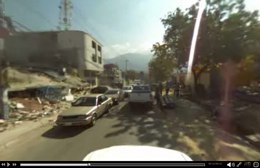Seems like Augmented Reality (AR) apps are about to change our daily lives in a major (epic?) way lately. A recent series of AR workshops convened by Macquarie University’s Learning and Teaching Research Cluster group (LTRC) elicited participant responses ranging from idle curiosity to something approaching Shock and Awe. Not so much because of the graphic awesomeness of some of the projections used as exemplars, but rather the enormous potential for development that became apparent as attendees came to realize just what this technology can offer. AU has only recently begun to emerge from a hacker community setting into the harsh reality of commercial networks with R&D dollars to burn – on anything that currently seems to be capturing the mind of early adopters and netizens generally.
Google is backing and promoting an AR app called Ingress that leads participants to geo-locations in a city, then lets them “hack” the location and link it to other locs, capturing territory in the process. It’s a game you have to play on a real landscape and involves physical and mental effort in spades. Here’s a longish vid that takes you through the Ingress setup:
They’ve chosen to promote the game through a series of viral video clips that provide more questions than answers about what the game is all about. Actually, a quote from the Ingress Initial Briefing page can probably explain the purpose of the game better than I can:
“The primary goal of the game is defend the takeover of the human race by an unknown “Shaper” force or, depending on your perspective, to assist in an “Enlightenment” of mankind through an alliance with the Shapers.”
Basically, you have to choose between the Resistance and Enlightenment factions, not unlike Tris choosing Dauntless over Erudite in Divergent, the first book in Veronica Roth’s futuristic trilogy. Read Rachel Metz’s excellent overview of Ingress in e-mag MIT Technology Review. This game is currently invitation-only and runs on Android-based phones for the moment, with an IOS version promised in the near future.
While waiting, IPhone owners may want to opt for a similar cityscape game called Shadow Cities. The free app can be downloaded from the iTunes App store. Here’s the trailer:













![Reblog this post [with Zemanta]](https://i0.wp.com/img.zemanta.com/reblog_e.png)
